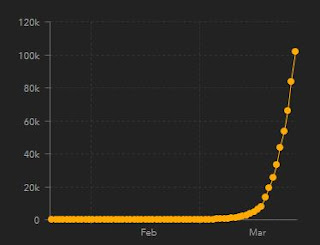When I moved into my central-Virginia home, lawn-mowing season began in early May. After two or three years passed, I had to mow in late April. Then mid-April. Then early April. Then late March. You get the idea. Every two or three years, lawn-mowing season begins a little earlier.
This year, lawn-mowing season began on March 9 (technically still winter). The lawn needed mowing again ten days later but I procrastinated—partly because it’s what I do, and partly because we’ve had rainy weather on and off. Today, March 29, I mowed again. The day was hot so I waited until late afternoon, when the outside temperature had cooled to 89°F (according to the National Weather Service).
In 2015, Senator James Inhofe declared global warming was a hoax and for proof he held up a snowball in Congress. While that day happened to be very cold in the eastern US, 2015 overall ranked as the hottest year ever recorded globally (a record we broke again in 2016). I want the senator to come to my house one late winter day and tell me my grass is not tall. I imagine he’ll say, “Your grass is not tall; it’s merely very un-short.” And bring your snowball, senator. Where I live, we don’t see many of them any more.




 would have us believe I just bought 72 rolls of paper. The package contains 18 rolls of paper but the toilet paper people want us to believe each roll of paper is really 4 rolls.
would have us believe I just bought 72 rolls of paper. The package contains 18 rolls of paper but the toilet paper people want us to believe each roll of paper is really 4 rolls.